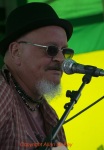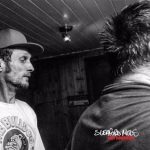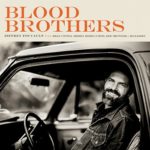 “Blood Brothers” has a very familiar sound; it’s the sound of 1970s Laurel Canyon. That’s not a criticism; the Canyon was a creative hub in the seventies California music scene and it’s no coincidence that Don Henley, a member of that scene covers Jeffrey Foucault’s songs in his live sets. The arrangements and stylings all have the feel of those classic Elektra/Asylum albums of the early 70s. Jeffrey Foucault also has a voice that’s straight out of that era with hints of Randy Meisner and Jackson Browne in there. And, like those albums, the musicianship is of the highest quality while being largely understated. No flash, just perfect settings that allow the ten songs to breathe and shine. And the whole thing was recorded directly to tape over three days in Pachyderm Studios in Minnesota.
“Blood Brothers” has a very familiar sound; it’s the sound of 1970s Laurel Canyon. That’s not a criticism; the Canyon was a creative hub in the seventies California music scene and it’s no coincidence that Don Henley, a member of that scene covers Jeffrey Foucault’s songs in his live sets. The arrangements and stylings all have the feel of those classic Elektra/Asylum albums of the early 70s. Jeffrey Foucault also has a voice that’s straight out of that era with hints of Randy Meisner and Jackson Browne in there. And, like those albums, the musicianship is of the highest quality while being largely understated. No flash, just perfect settings that allow the ten songs to breathe and shine. And the whole thing was recorded directly to tape over three days in Pachyderm Studios in Minnesota.
The opening song “Dishes” sets the tone for the album lyrically and musically. It’s gentle, laid-back and extols the virtues of domestic simplicity, whereas the second song, the apocalyptic, end-of-days “War on the Radio” is less typical. It has a country-rock feel with more of an emphasis on the rock, and is driven along by fiddle fills as we look into the abyss.
The rest of the album has the same DNA as “Dishes”, gentle arrangements pulling out the best in stories of domesticity in small-town America peopled with the characters that we can all relate to: the frustrated singer-songwriter in ”Cheap Suit” and the father looking back at his wedding day (with the album’s second reference to washing dishes) in “Little Warble”, with its clever lyrical device of ‘warble’ appearing at the start of the song in relation to the car’s tape player and at the end in relation to the singer’s heartbeat.
“Little Warble” has a country feel, while the rest of the album is Elektra/Asylum (you’d swear David Lindley was there) apart from the Neil Young-tinged “Blood Brothers” and “Rio” which is pure “Harvest Moon” with picked guitar, drums with brushes and pedal steel. If you’re a fan of the Eagles/Jackson Browne school of music, then you’re probably going to enjoy this album.
“Blood Brothers” is out now on Blueblade Records (BB-006).
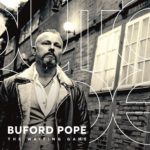 Buford Pope’s American influences shine through on “The Waiting Game”. His introduction to American music was Bob Dylan but the most obvious comparison vocally is the high register vocals of Neil Young. There’s a reference in the album’s second song, “Hey Hey Aha”, to the difficulties of songwriting (and a subtle nod to Shakey again) and writer’s block, but the songs all worked out fine in the end and the calling card for “The Waiting Game” is the way they have been arranged. And that’s apparent from the very start.
Buford Pope’s American influences shine through on “The Waiting Game”. His introduction to American music was Bob Dylan but the most obvious comparison vocally is the high register vocals of Neil Young. There’s a reference in the album’s second song, “Hey Hey Aha”, to the difficulties of songwriting (and a subtle nod to Shakey again) and writer’s block, but the songs all worked out fine in the end and the calling card for “The Waiting Game” is the way they have been arranged. And that’s apparent from the very start.
“America” (a lyrical co-write with Mark Drake) is the collaboration that Neil Young and The Blue Nile haven’t quite got round to yet. It’s an atmospheric love song to America with a big bassline and a new frontier theme with songsters replacing pioneers. The high tenor range of the voice, the melancholy subject matter and the country-rock feel of “Hard Life” make vocal comparisons with Don Henley difficult to avoid, but it’s difficult to see how that’s a bad thing. I mentioned arrangements earlier and the most innovative has to be “A Hundred”.
The minimalist production is built around a bass drum on one and three and a layered handclap on two and four which repeats remorselessly throughout the song as the blues builds up with the addition of bass and banjo. It hints at the foot stamps of Brian May’s percussion innovation for “We Will Rock You” (a reference you might not expect to hear on an Americana album). Incidentally, a country, honky-tonk reworking of the song, listed as “Ninety-Nine” closes out the album.
It’s the kind of album that you get when an someone without the baggage of a ‘scene’ or ‘movement’ to contend with (living in a remote part of Sweden) can concoct by taking original American influences and subject matter and melding them with elements from outside this genre to produce something that’s unique. It’s an intriguing listen.
“The Waiting Game” is out now.
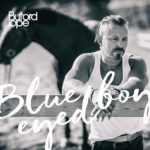 I don’t know why the idea of Scandinavian Americana should have seemed so strange at first; significant numbers of Scandinavians emigrated to the USA in the nineteenth century and it’s reasonable to assume that they brought their own flavours to America’s rich musical stew and that there would still be a cultural connection. Turns out that Americana is big in that part of northern Europe, both in homegrown and imported flavours, and that’s where Buford Pope (real name Mikael Liljeborg) comes in. Although he references Dylan as a touchstone, it’s difficult not to draw comparisons with Neil Young (particularly the Stray Gators phase) because of the high, keening voice and the plaintive pedal steel licks that permeate the album.
I don’t know why the idea of Scandinavian Americana should have seemed so strange at first; significant numbers of Scandinavians emigrated to the USA in the nineteenth century and it’s reasonable to assume that they brought their own flavours to America’s rich musical stew and that there would still be a cultural connection. Turns out that Americana is big in that part of northern Europe, both in homegrown and imported flavours, and that’s where Buford Pope (real name Mikael Liljeborg) comes in. Although he references Dylan as a touchstone, it’s difficult not to draw comparisons with Neil Young (particularly the Stray Gators phase) because of the high, keening voice and the plaintive pedal steel licks that permeate the album.
For his seventh album Buford Pope has opted for the naturalistic approach; learn the songs, get the right technical set-up and go in and play them once. And it works, although the album’s opening song “Still Got Dreams” is a bit too lo-fi for my taste. The lyrics deal with familiar roots themes: guns, drinking, driving (sometimes both at the same time) and families all feature in the mix. The recording process gives the album an intimacy and immediacy that recording tracks separately can never quite capture and highlights the interplay between the instruments, particularly the combination of slide or pedal steel and piano on “Infirmary” and “No Man’s Land”.
Standout songs? Well, the big chorus of “Freewheeling” and the epic Al Stewart feel of “The Baltic Sea” certainly do it for me.
“Blue-Eyed Boy” is released on Friday September 22 on Unchained Records (BP2017).
 Review this album in one word? Gorgeous; ten beautifully-crafted and perfectly-arranged songs, six highly-gifted players and vocal harmonies to die for. If you’re looking for reference points, most of the songs here sound like they could have come from the late sixties/early seventies country-rock scene with understated playing, crystal clear production and those heavenly harmonies. “Great Shakes” is a perfect demonstration of the chemistry that great musicians can create when the stars are perfectly aligned. The album isn’t about the individual musicians, it’s about the contributions they make towards creating the best possible version of each song; in those terms, it’s a complete success, with each instrumental fill making each song that little bit more memorable.
Review this album in one word? Gorgeous; ten beautifully-crafted and perfectly-arranged songs, six highly-gifted players and vocal harmonies to die for. If you’re looking for reference points, most of the songs here sound like they could have come from the late sixties/early seventies country-rock scene with understated playing, crystal clear production and those heavenly harmonies. “Great Shakes” is a perfect demonstration of the chemistry that great musicians can create when the stars are perfectly aligned. The album isn’t about the individual musicians, it’s about the contributions they make towards creating the best possible version of each song; in those terms, it’s a complete success, with each instrumental fill making each song that little bit more memorable.
The members of Session Americana are Billy Beard (drums), Ry Cavanaugh (guitar), Kimon Kirk (bass), Jim Fitting (harmonica), Dinty Child (multi-instrumentalist) and Jefferson Hamer (guitar) and this is their seventh album as a collective, although it has a coherence that suggests a long-established band, rather than occasional collaborators. The album opens with the delicate country-rock feel of “One Skinner”, a story of a long-standing friendship with a musical setting featuring pedal steel and harmonica and a lead vocal with a vulnerability that suggests Neil Young or Iain Matthews and blossoms out into a hugely varied set of songs with subjects as varied as American history (“Great Western Rail”) and an umbrella (“Bumbershoot”). Five of the members contribute songs in different styles but always of the highest quality and usually with an interesting twist.
There isn’t a bad or even indifferent song on the album and there are a few that stand out. “Big Mill in Bogalusa” is a bluesy shuffle with some raw harmonica and harmonies from the whole band; it’s catchy and full of the feelgood. “Mississippi Mud” is a historical Southern story built around an over-driven guitar riff which morphs into an Allman Brothers boogie in the choruses and it leads into the album’s most poignant song, “One Good Rain”, with the message that every relationship, no matter how strong, can be vulnerable. Just the line ‘One good rain is all it takes to break the dam that love can make’ is one of the saddest things I’ve heard this year.
This album will wrap itself around you like a comfortable jumper on a winter night. It will make you smile at times and it might even make you cry, but you’ll certainly feel uplifted and full of admiration for the quality of the playing.
“Great Shakes” is released on October 14th.
 Keegan McInroe seems pretty relaxed about the whole process of touring, in fact he seems pretty relaxed all round. If you listen to his latest album, “Uncouth Pilgrims”, you’ll know that he’s travelled extensively and used his experiences to create some great songs. It’s obvious from the moment you open the door of The Lighthouse on Battersea Park Road that it’s not the ideal gig for a singer/songwriter. It’s Friday night, noisy and full of the ‘few beers after work’ crowd, but Keegan doesn’t seem too bothered; it’s a gig he’s done since his first tour here in 2004 even though the pub has changed hands and function since then. Having a quick chat before the gig, he’s remarkably unfazed by the audience, explaining that he’ll just play a few more covers than usual and some of the songs from the new album.
Keegan McInroe seems pretty relaxed about the whole process of touring, in fact he seems pretty relaxed all round. If you listen to his latest album, “Uncouth Pilgrims”, you’ll know that he’s travelled extensively and used his experiences to create some great songs. It’s obvious from the moment you open the door of The Lighthouse on Battersea Park Road that it’s not the ideal gig for a singer/songwriter. It’s Friday night, noisy and full of the ‘few beers after work’ crowd, but Keegan doesn’t seem too bothered; it’s a gig he’s done since his first tour here in 2004 even though the pub has changed hands and function since then. Having a quick chat before the gig, he’s remarkably unfazed by the audience, explaining that he’ll just play a few more covers than usual and some of the songs from the new album.
And that’s just what he did. His own material, mainly from the new album, was slotted fairly evenly into the two sets and included “Lumberjack Blues”, “Give Me the Rain”, “I Got Trouble”, “Flower Song for Barefoot Dancers”, “Nikolina” and “Lay Down”. The stripped-down versions worked beautifully live and the audience didn’t distract too much; there was even a fair smattering of applause around the room.
As for the covers, well, he didn’t put a foot wrong; he even played a couple of unexpected old favourites of mine. There were songs by the songwriting giants (Tom Waits, Townes Van Zandt, Willie Nelson, Neil Young and a tribute to Merle Haggard) and a few less predictable choices. Only three songs in, he made the brave choice of tackling Hoagy Carmichael’s “Georgia” and, despite a fairly noisy crowd, he made it work. The more esoteric song choices added the spice that made the evening unique; Stevie Ray Vaughan’s “Life by the Drop” and Warren Zevon’s “Carmelita” (both stories of addiction) introduced an element of pathos, while Muddy Waters’ “Champagne and Reefer” and Elmore James’ “Dust My Broom” (which closed the second set) gave Keegan the chance to demonstrate his blues licks.
If this gig had been in an established ‘listening room’, the audience chatter would have been hugely distracting, but it was a free gig in a local pub and Keegan took a pragmatic view of the situation, playing to the people who were interested and tuning out those who weren’t. His own songs are well crafted and worked perfectly in the stripped-down format. He’s also a really nice guy.
“Uncouth Pilgrims” is released on Friday May 27th
We’re officially giving a big thank you to Phil Burdett for this contribution. Phil should have been playing a launch gig for his two (yes, two) new Drumfire Records albums tonight, but he’s spent a few days in hospital this week and he’s at home now recovering. Despite that, he still managed to write about his five favourite things this year for us; we salute you Mr Burdett and we hope that your recovery is swift and complete.
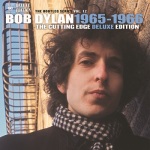 Bob Dylan – “The Cutting Edge”
Bob Dylan – “The Cutting Edge”
The fabulous set of out-takes from the Zimmerman back catalogue is a fascinating peek through the studio door as his muse churns & twists words & phrases to fit the evolving music. A must for any Bobcats still stuck in his anorak pocket.
A new breath of fresh air that I only got into after going on a local radio show during which they played me songs I’d probably hate to get me to slag them off. I did and got banned but this one I liked. Has a DIY, Rough Trade, shouty, 1978 kinda vibe & I’m into that kinda vibe, y’know?
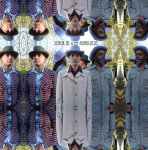 Senor Al & the Honolulus – “Bluestronic Soul”
Senor Al & the Honolulus – “Bluestronic Soul”
Somewhere at a party thrown by Roky Erikson through amps designed by Neil Young, the bastard child of Captain Beefheart & a tequila-wrecked lay preacher from San Jose testifies…strictly late 2014 but I missed it.
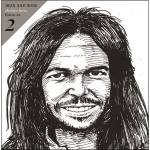 Iron and Wine – Archive Series Volume No. 2
Iron and Wine – Archive Series Volume No. 2
Grumbly little shards of country lo-fi that either intrigue or delight in equal measure, both of which are fine by me.
 X Factor getting less viewers than Antiques Roadshow
X Factor getting less viewers than Antiques Roadshow
Bunch of so called experts judging people who are only in it for how much money they’re gonna make…Mind you, that X Factor’s just as bad…
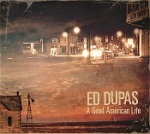 Now, here’s an interesting debut. Born in Texas, brought up in Winnipeg and now based in Ann Arbor, Michigan, Ed Dupas has definitely paid his dues, as we oldies say, and he’s released a cracking album. He’s spent years playing acoustic covers in bars around Detroit while writing his own material and the efforts he’s made in writing and performance are evident in the quality of “A Good American Life”. This is an album that doesn’t need any production gimmicks to get its message over; the songs are strong and the simple arrangements and understated vocals are much more effective than any amount of studio tricks.
Now, here’s an interesting debut. Born in Texas, brought up in Winnipeg and now based in Ann Arbor, Michigan, Ed Dupas has definitely paid his dues, as we oldies say, and he’s released a cracking album. He’s spent years playing acoustic covers in bars around Detroit while writing his own material and the efforts he’s made in writing and performance are evident in the quality of “A Good American Life”. This is an album that doesn’t need any production gimmicks to get its message over; the songs are strong and the simple arrangements and understated vocals are much more effective than any amount of studio tricks.
Two-thirds of the songs on “A Good American Life” have the personal themes that you might expect from an Americana singer-songwriter; “Remember My Love” and “Too Late Now” are about the singer’s perspective on broken relationships, while “With Love You Never Know” (a duet with Tara Cleveland) looks at a breakup from a female point of view and “You Don’t Get to Explain” talks about the kind of betrayal so complete that it leads to total ostracism. Ed skirts around the nature of the betrayal in an oblique style that is used in several songs on the album; it’s a particularly effective device because it reflects the way we tell our stories and it gives the songs a very human touch.
“Without You” and “Whiskey Bones” are love songs, powerfully and beautifully underplayed, while “Home in Time” is the story of someone who has escaped being dragged back home by a major event. Again, it’s an oblique reference, but the song isn’t any weaker because the event is unspecified; and it’s a very powerful story. “Until Blue Comes ‘Round” is a look at the cycles of life using a colour metaphor, which is, again, highly effective.
As good as those songs are, and they’re very, very good, it’s the remaining third, including the title track, that really do it for me. It’s acceptable to be a political singer-songwriter these days: Jackson Browne’s been doing it for years, the Boss’s “Wrecking Ball” ripped in to the bankers and Shakey now has the world record for mentions of Monsanto and Starbucks on one album (and a great album, at that) but Ed’s a bit more subtle than that. “A Good American Life” (with a sneaky piano fill reference to the Bangles’ “Manic Monday”) opens the album with a look at the way we come to accept the treadmill of everyday life while “This Old Town” and “Train” explore the themes that Springsteen used on “Wrecking Ball”, the death of towns when industry vanishes and the ubiquity of bankers in modern society.
“Flag” is an absolute gem of a song. Ed uses a bit of lyrical sleight of hand with a refrain of ‘red, white and blue till the day I die’ to suggest a gentle song about American patriotism then delivers the knockout punch as the flag’s folded and handed to someone’s widow. It’s a song that’s beautifully put together and incredibly moving; easy to listen to, hard to forget. All of the songs are all perfectly crafted little stories that don’t need any frills, just a gentle delivery and a willing audience. You should join that audience.
Released in the UK August 28 2015 on Mackinaw Harvest Records.
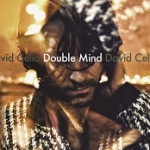 It’s interesting that Toronto-based guitarist and songwriter David Celia has chosen “Double Mind” as the song and central theme for his fourth album; it suggests a dichotomy in modern life that might even extend as far as schizophrenia but, for me, the album conjures up a totally different duality. In the old football (or soccer) cliché, this one’s a game of two halves, which splits almost exactly down the middle. If it was split over two sides of vinyl, I would very happily listen to side one and ignore side two completely. So what is it about this album that provokes such a mixed reaction?
It’s interesting that Toronto-based guitarist and songwriter David Celia has chosen “Double Mind” as the song and central theme for his fourth album; it suggests a dichotomy in modern life that might even extend as far as schizophrenia but, for me, the album conjures up a totally different duality. In the old football (or soccer) cliché, this one’s a game of two halves, which splits almost exactly down the middle. If it was split over two sides of vinyl, I would very happily listen to side one and ignore side two completely. So what is it about this album that provokes such a mixed reaction?
The album opens with “Welcome to the Show”, a West Coast, country-rock tinged song which demonstrates Celia’s songwriting and features some lovely guitar work. It’s a scene-setter and it gives a pretty good idea of what’s coming on the first half of the album. Vocally, he has echoes of Jackson Browne or Neil Young and the songs are rooted firmly in singer-songwriter territory dealing with the struggles of modern life (“The Grind”), looking for a soul-mate (“Speak to Me”) and the schism caused by multi-tasking (“Double Mind”). “Thin Disguise” which deals with putting on a brave face after a break-up has hint of Springsteen’s “Kitty’s Back”, particularly the walking bass line, and the album’s first half is high-quality, inventive, introspective songwriting with musical performances to back it up. The only discordant tone is “Tongues”, which moves away from relatively serious territory into something more light-hearted and contains the clunky line ‘Don’t be shy with your region of nether’; it’s not the album’s finest lyrical moment.
The light-hearted (and lightweight) “Drunken Yoga” and “Go Naked” (which mashes up Elton John’s “Crocodile Rock” with Beach Boys harmonies) sound out of place on a predominantly serious album, but not as much as “Princess Katie” which is David Celia’s “Frog Chorus”; it is possible to take the Beatles comparisons too far. The album’s closing track, a German version of the opener doesn’t really add much to the listening experience, either. It’s not all unbridled levity in the second half of the album; “Want You to be Happy” is a break-up song and the album’s longest song, “Smile You’re Alive” again has a seventies singer-songwriter feel ( a bit Neil Young, a bit Simon and Garfunkel’s “America” maybe) although the discordant piano coda feels a little out of place.
Listening to “Double Mind” as an entity is a frustrating experience as it bumps along from the sublime to, well, “Princess Katie”. It’s obvious that David Celia is absolutely fizzing with musical ideas and wants to get all of them out there but I’m not convinced that they all fit together happily here. You could easily cut out the more lightweight songs and transform this into a four-star album with nine or ten very strong songs.
“Double Mind” is out on August 21 on Seedling Music and David will be touring the UK in November.
 Well, that’s another one for the bucket list. It’s taken a long time but I’ve finally had a conversation with someone who began a sentence with ‘Y’all…’, so thank you very much Hannah Aldridge from Muscle Shoals, Alabama for finally putting that one right for me. I was at Green Note to see Don Gallardo and Hannah on the last night of the UK tour to promote their respective current albums, Don’s “Hickory” and Hannah’s “Razor Wire”. Don’s band for the tour has been Travis Stock (playing bass, mandolin and guitar) and two musicians from the UK on keyboards and pedal steel, while Hannah has been delivering a stripped-back solo acoustic set of songs from her debut album, plus a bit of new material as well.
Well, that’s another one for the bucket list. It’s taken a long time but I’ve finally had a conversation with someone who began a sentence with ‘Y’all…’, so thank you very much Hannah Aldridge from Muscle Shoals, Alabama for finally putting that one right for me. I was at Green Note to see Don Gallardo and Hannah on the last night of the UK tour to promote their respective current albums, Don’s “Hickory” and Hannah’s “Razor Wire”. Don’s band for the tour has been Travis Stock (playing bass, mandolin and guitar) and two musicians from the UK on keyboards and pedal steel, while Hannah has been delivering a stripped-back solo acoustic set of songs from her debut album, plus a bit of new material as well.
As always, the Green Note audience on this sold-out night was attentive and appreciative giving both artists a warm response. Don Gallardo played a set featuring songs from his new album including “Diamonds and Gold”, “Carousel”, “Ophelia, We Cry (Ode to Levon Helm)”, “The North Dakota Blues” and the superb “Down in the Valley”. Don’s easy geniality between songs created a warm atmosphere that was perfectly suited to the intimacy of the venue and the set came to a perfect close with Hannah joining the band on a cover of the Neil Young/CSNY song “Helpless”; it was one of many spine-tingling moments on the night.
Hannah Aldridge’s songs on her debut album “Razor Wire” are intensely personal and confessional; at times they’re brutally honest and even harrowing. The band arrangements on the album aren’t obtrusive, so it’s relatively easy to see how the songs would work as unplugged versions in a live setting, but Hannah also has a few curve-balls to throw, which is impressive under the circumstances; she’s been ill throughout the tour and has just started to recover and get her voice back to full power.
From the start of the set, Hannah pitched her between-song delivery somewhere between the real Hannah and the more strident, harder Hannah who appears on the cover of the album; you think it’s mostly a stage persona, but you probably wouldn’t push your luck to find out. She had a setlist prepared but after the opener “You Ain’t Worth the Fight”, all bets were off as the audience had their say and Hannah adjusted the dynamics of the set accordingly. “Rails to Ride” (from 2013) and the superb new song, “Gold Rush” were the only songs in the set not featured on “Razor Wire”.
The entire set was absolutely spellbinding as Hannah poured her soul into “Old Ghost”, “Razor Wire” and “Black and White”, but two songs stood out, for different reasons, from the rest of the set. “Parchman”, unlike most of Hannah’s songs, was inspired by something outside her personal experience; it’s about a female prisoner waiting to be executed at the Mississippi State Penitentiary (known colloquially as Parchman Farm) for the murder of her abusive husband. The song pulls no punches, and had the audience enthralled throughout. For the final song of the set, “Howlin’ Bones”, Hannah left the security of the stage, and amplified vocals, to take the song direct to the audience, moving around the room to deliver a raw and genuinely unplugged version of a powerful song. You couldn’t call it easy listening, but it was raw and compulsive.
Although the entire evening was packed with lovely moments, Hannah Aldridge’s set confirmed my suspicion that she not only has a gift for turning life into art, but she’s also a hugely gifted and empathic performer who can project the emotional power of her songs. We may have missed out on the Jackson Browne cover “These Days” on the night, but this was a stunning solo performance of songs of the highest quality.
Watch out for her next UK tour, but check out “Razor Wire” in the meantime.
So, another week in the music business and the hot topic is copyright again; that’s surprised everyone hasn’t it? Apple announces its new streaming service and a great introductory three month deal which it proposes to fund by not paying any royalties to artists. Predictably enough the Anne Robinson of digital rights management rides to the rescue. After taking on Spotify last year, Taylor Swift took aim at Apple this time with an open letter which has forced Apple to rethink its strategy of giving away other people’s earnings. Predictably again, it sparked off an online debate about hypocrisy when a photographer sent Ms Swift an open letter about photographic rights. It’s amazing how quickly these ‘debates’ descend into playground name-calling and tribalism; have a look for yourself but it’s not for the faint-hearted. Anyway, it’s all happy now because Apple has backed down and the artists will be paid.
While all that was going on centre-stage, you could easily miss another bit of copyright news being made which wasn’t attracting the attention of the popular and powerful Ms Swift. Various British music industry bodies, Musicians Union (MU), UK Music, and British Academy of Songwriters, Composers and Authors (BASCA) if you must know, have combined to request a judicial review into the creation of Section 28B of the Copyright, Designs and Patents Act 1988. Now that’s a real headline grabber isn’t it? In really simple terms, the government has inserted a clause (Section 28B) in the legislation, to take effect from June 2015, which made copying of CDs legal for personal, private use although you probably thought it was fine to do that anyway. The judicial process is far from over, but Mr Justice Green has upheld the review application.
On the face of it, these industry bodies are using the same principle as Taylor Swift, claiming that artists are losing royalties and that the industry shouldn’t allow this to happen, which is very noble of them, but if that’s true, then why take twenty years to decide that we shouldn’t be allowed to rip our CDs so we can listen to them on the train or create playlists for parties. Unless it isn’t just about that.
One of the remedies suggested by the music industry is a levy on recordable media (CDs, hard drives and so on), which has been tried in other European states. So call me an old cynic if you like, but surely their real concern is that the blank media industry is reaping the benefits of digital copying and the music industry isn’t getting its share. The UK proposal is a levy on blank media collected by an agency and shared out with artists. You don’t need a PhD to see that there’s absolutely no link between which songs are copied and the money coming in, so a huge and unnecessary bureaucracy has to be created to work out the collection and distribution process (supervised by the UK music biz). Anyone think that’s fair? And there’s an assumption that all digital media sold is being used for copying music; you can call me paranoid, but I have several hard drives and countless DVD-Rs full of original photos and there’s no way I’m paying duty on those so some chancer can copy Celine Dion’s Greatest Hits to flog in the market at Elephant & Castle. It’s like the whole class having to stay behind because the teacher doesn’t have the bottle to take on the bully.
So, how about an extra charge on every CD to account for a certain amount of ripping and copying? Well, one side of the argument is that no-one wants to pay for something that they can’t play on a device they use on the move, while, on the other hand, why should you pay extra if you have no intention of copying a CD? You could apply a charge when a CD is copied (or format-shifted) but who’s going to be happy about buying a CD from the artist’s website or at a gig to maximize the artist’s cut only to find that you then have to pay someone else for the privilege of listening to it on your media player. It’s equitable, but music buyers are going to be reminded of the cost every time they rip a CD (which is why MU, BASCA and UK Music don’t like it; they don’t look like the bad guys if you pay extra for a hard drive, rather than your music).
If the CD format is dying, and I’ve already bought a black tie, is this an attempt to accelerate its demise? If you’re buying a physical copy mainly to listen to it on a mobile device, why not just get rid of the middleman and buy it in a format you can load on to your media player? If there isn’t a physical copy you can eliminate the costs of artwork, packaging, storage and distribution and companies don’t need to worry about size of production runs when they sell on demand. If your album’s aimed at that hardcore who still want a physical package, then you can sell it on vinyl at a premium price and you can even throw in a digital download code, because it won’t increase your costs.
Let’s be completely honest about this; the music industry is going for the soft target again. Rather than try to take on organised counterfeiters, they’re trying to recoup their perceived losses by hitting, and alienating, music fans who have no objection to paying for a product. The business was quite happy to reap the benefits of digitisation in the production and distribution process but doesn’t like to see the customers using the same technology to shift formats for the user’s convenience. It certainly puts the eighties ‘Home taping is killing music’ campaign into perspective.
As always, the UK music establishment is frantically trying bolt the door when the stables have been empty for years while. Perhaps it’s one last cynical attempt to cash in on the punters who realise that they need to copy their CDs before the indestructible format vanishes and, ultimately, so do the CD players. So, if you’re one of those strange people that still believes in paying for music, you’ll have two choices: cheap and cheerful download or premium price (currently about twice the price of a CD) vinyl copy. As for streaming, well no artist I know is happy with their level of reward from Spotify, but the establishment’s comfortable with a lower percentage of an increasing volume for very little investment and the big players are now buying in to streaming services for their mass market activities.
Are there any alternatives to accepting the lower sound quality of MP3s and the high price of vinyl (and something to play it on if you didn’t save it from the first time round)? You could try uncompressed audio; Neil Young’s been touting his Pono format for a few years (other formats are available) and better internet bandwidth and bigger hard drives are making that more attractive now. Sound purists love it, but it’s a digital format and there’s no tactile packaging, photos or sleeve notes, and you could see it as just another way to resell back catalogue (again) in another format. Or maybe Cooking Vinyl MD, Martin Goldschmidt was right five years ago when he predicted the CD ‘will actually become a minority (non-mass market) format in the way that vinyl has’. Wouldn’t that be ironic?


